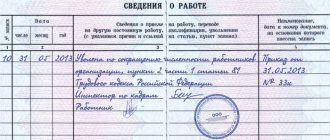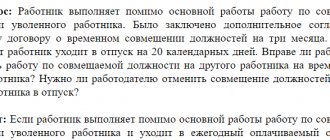What is truancy
In accordance with Article 81 of the Labor Code of the Russian Federation, Resolution of the Plenum of the Supreme Court of the Russian Federation dated March 17, 2004 No. 2, as well as based on established practice, any of the following actions by an employee are considered absenteeism:
- absenteeism, that is, absence from work without good reason throughout the entire working day - regardless of its duration;
- being outside the workplace without good reason for more than four hours in a row during the working day;
- leaving work without a good reason - without warning the employer of dismissal or before the expiration of a two-week period of work;
- unauthorized use of days off;
- unauthorized departure on main or additional leave, if the time of use of vacation days had to be agreed upon with the employer.
How to register absence using documents
The absence of an employee must be recorded in writing.
1. At the end of the working day, in the presence of several witnesses and in free form, an act , which indicates information about the employee and the number of hours he was absent.
For impartiality, it is better to involve people from other departments or divisions as witnesses. 2. The time sheet should record only those hours that the employee actually worked: for example, 4 hours in case of absence or NN in case of absence. If the employee shows up later and the reason for his absence turns out to be valid (for example, a document from a medical institution), then an adjustment report card with amendments is drawn up.
Photo from the site kredits-info.ru
What is disciplinary action
The Labor Code of the Russian Federation provides for three types of disciplinary sanctions of varying degrees of impact for guilty misconduct of full-time employees, namely:
- comment;
- rebuke;
- dismissal at the initiative of the employer or for other legal reasons.
Dismissal for absenteeism is a disciplinary sanction, but is not a necessary consequence of absenteeism. Indeed, when choosing a measure of responsibility in relation to an employee, one should take into account the severity of the act committed and the circumstances under which it was committed.
How to fire someone for absenteeism
Before punishing an employee for absenteeism, and even more so, dismissing him, the employer is obliged to complete all stages of the procedure from Article 193 of the Labor Code of the Russian Federation. This procedure involves:
- establishing the fact of the employee’s absence from the workplace for a period of time sufficient for absenteeism to occur;
- documenting the fact of absence with signs of truancy;
- clarification of the valid reasons for the employee’s absence.
First of all, the employer is obliged to request a written explanation from the employee why he was not present. If a person is absent for a long time, then the employer is obliged to take measures to find out why the employee does not come to work - for example:
- send him a letter with acknowledgment of delivery with an offer to appear at work and give an explanation for his absence;
- go to the employee’s place of residence, if possible, communicate with the spouse, relatives and neighbors to find out the reasons for the employee’s absence;
- report a missing person to the internal affairs body (letter from Rostrud dated December 4, 2020 No. PG/56975-6-1).
It is necessary to look for an employee, since before punishing him, the employer must have documents confirming the disrespect of the reason for his absence from work (letter of Rostrud dated July 11, 2006 No. 1074-6-1). The Labor Code of the Russian Federation does not contain a list of valid reasons, so in each case the employer decides this issue independently, depending on the specific circumstances.
If the employee cannot be found, he does not show up for work and does not give an explanation, then the employer should not punish him, but draw up a report stating that:
- the employee does not come to work;
- It is not possible to request an explanation of the reasons for his absence.
Walk with respect
Local courts sided with the employer. And the offended plaintiff found the strength to reach the Supreme Court. There they examined the case and stated that if an employee did not come to work for a good reason and even took measures to ensure the work process in his absence, then such an employee cannot be fired. The Supreme Court outlined an important principle for such circumstances: firing a person is a last resort. And even if the employee did not return to work for an unexcused reason, before dismissal you need to look at his behavior and attitude towards work.
This story began with the fact that a woman did not show up for work. The reason: her nephew had to be urgently taken to the emergency room - the child broke his nose during training in the sports section. The only way to warn the authorities at that moment was an SMS message. Before this, the citizen called her colleague and asked to replace her.
The next day, she brought medical documents to her boss to confirm the reason for her absence from work. But it did not help. Her employment contract was terminated for absenteeism. And the citizen went to court.
The case was heard in the Babushkinsky Court of Moscow, which sided with the employer. Later, the Moscow City Court agreed with this position.
RG experts discuss the legal aspects of labor relations in the “Legal Consultation” section
According to the district court, the dismissed woman did not provide legal evidence that it was she who should have taken her nephew to the doctor. And the court also said that the citizen did not have permission from her superiors to miss work. And the fact that she asked a colleague to replace her at the workplace does not mean anything. The court concluded that the plaintiff committed absenteeism without good reason and without permission from her superiors.
The Supreme Court did not agree with such statements. And he began his arguments with the Labor Code, which allows an employer to fire an employee for absenteeism without good reason. Moreover, this is considered a serious violation. But when punishing a truant, the Supreme Court emphasized, one must take into account the severity of the offense committed and the circumstances under which it was committed. This is written in Article 192 of the Labor Code of the Russian Federation.
In our case, in the opinion of the high court, local courts, when checking the legality of the employer’s actions, should have proceeded from the general principles of legal, and therefore disciplinary liability. In particular, such as justice, proportionality, legality.
The courts must evaluate all the circumstances of such a case, including the reasons for the employee’s absence from work. The Constitutional Court mentioned these important points three times in its rulings. (No. 75-O-O dated February 19, 2009, No. 1793-O dated September 24, 2012, No. 1288-O dated June 24, 2014, No. 1243-O dated June 23, 2015).
And there is one more serious point that the high court drew attention to. The obligation to prove the existence of a legal basis for dismissal and compliance with the established procedure for dismissal rests with the employer. This was stated in the resolution of the Plenum of the Supreme Court dated March 17, 2004 No. 2.
This resolution emphasizes that it is the employer who is obliged to provide evidence indicating that the employee has committed one of the gross violations of labor legislation.
“It is mandatory for the correct resolution of a dispute to establish the circumstances and reasons (whether valid or not) for the employee’s absence from the workplace,” the Supreme Court reminds.
According to the Supreme Court, the district court “erroneously believed that what matters primarily is whether or not the employee received the consent of her manager to miss her shift.”
Such a conclusion was made in violation of procedural law and contradicts the case materials, the Supreme Court believes. Judging by the case materials, the plaintiff explained to the employer, as well as in court hearings, that there were valid reasons for absence from work - due to the need to be with her nephew in the hospital.
The woman said that she lives with her sister and her son. And that they are one family, running a common household together. Therefore, she takes a direct part in the life and upbringing of her nephew. This includes taking him to school and sports clubs.
On that fateful day, the boy's mother was in the hospital visiting their mother, who had just suffered a stroke. And the nephew was playing hockey in the yard, during the match he suffered a broken nose, and the woman took him to the emergency room, from where the child was hospitalized. Naturally, the aunt went to the hospital with the child.
At this time, she sent an SMS message to her boss saying that she would not be able to go to work, but they would replace her. According to the plaintiff, this method of notification was their established practice.
The plaintiff’s replacement, who replaced her on the day of absenteeism, also spoke in court. She told the court that she warned the deputy manager that she would work the shift for her. She was unable to reach her immediate superior by phone. We have a routine at work: call your boss and explain the situation, the witness said.
Despite this, the district court in its decision rejected the plaintiff’s arguments without giving reasons why he did this. And he justified his conclusion about the absence of valid reasons for not showing up for work as follows: the plaintiff did not provide the court with evidence of the manager’s consent to her absence from work.
The courts formally approached the case related to violation of labor rights, which is unacceptable
Based on this, the Supreme Court concluded: the position of the district court does not correspond to legal norms. The Supreme Court indicated that the district colleagues had to question the deputy chief, whom the shift worker had notified about the plaintiff’s absence from work. And the city court did not correct this error of the district court.
The Supreme Court saw other serious shortcomings in the appeal decision. Thus, the content of the appeal ruling does not correspond to the case materials. It records that the prosecutor gave an opinion on the legality and validity of the decision of the court of first instance, while from the record of the court session it follows that the prosecutor gave an opinion on the illegality and groundlessness of the plaintiff’s dismissal from work and the existence of grounds for satisfying the claims.
Local courts, the Supreme Court emphasized, ignored the fact that the defendant did not provide any evidence that when making a decision on dismissal, he took into account the severity of the disciplinary offense and the circumstances in which it was committed, as well as the fact that the defendant took into account the employee’s previous behavior and her attitude to work. The courts of first and appellate instances did not examine the possibility of the defendant applying another, less severe type of disciplinary sanction.
Under such circumstances, the courts' conclusions that the employer had grounds for dismissal for absenteeism are unlawful. The courts did not determine the circumstances relevant to the case and which party should prove them, did not establish these circumstances, and did not collectively evaluate the evidence available in the case. The courts formally approached the consideration of this case related to violation of labor rights, which is unacceptable when resolving a dispute of this category, the Supreme Court emphasized.
He overturned the decision of the district and city courts and returned the case for a new trial.
What bonuses are awarded for overtime work:
Absence due to illness
In accordance with Article 373 of the Labor Code of the Russian Federation, during periods of temporary incapacity for work, the employee retains his place of work (position). And Article 81 of the Labor Code of the Russian Federation states that the dismissal of an employee during a period of temporary disability at the initiative of the employer is not allowed, except in cases where the organization is liquidated or the entrepreneur ceases its activities.
It follows from this that the employee’s illness is a valid reason for his failure to fulfill his work duties, and under such circumstances he cannot be dismissed at the initiative of the employer. Whereas in the situation from the commented letter, the employer, before dismissing the employee, was not convinced that the reason for his absence from work was disrespectful (letter of the Ministry of Labor of Russia dated November 7, 2019 No. 14-2/B-912).
Consequently, the employer did not strictly follow the procedure enshrined in Article 193 of the Labor Code of the Russian Federation. This means that the employee can challenge the dismissal on the grounds that in the event of temporary incapacity for work, he could not exercise his right to provide an explanation. When making a decision, the court will check the employer’s compliance with the dismissal procedure under the Labor Code of the Russian Federation and, most likely, will recognize the dismissal as illegal after requesting written explanations from the employee during the period of his temporary disability (Review of the practice of courts considering cases on disputes related to the termination of an employment contract at the initiative of the employer, approved Presidium of the Supreme Court of the Russian Federation 12/09/2020).










